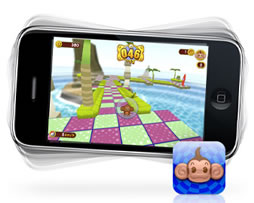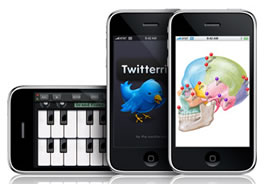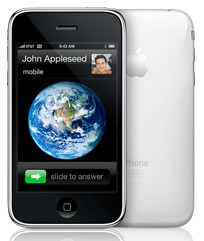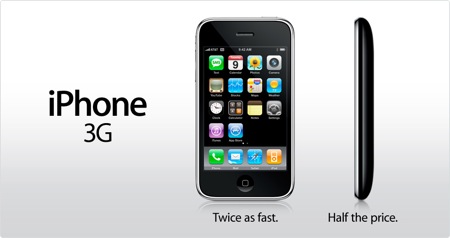The iPhone Looks Cheaper and Faster Than Ever
On Monday, Steve Jobs and his regular stable of Apple executives made a nice event around the iPhone - the newest in their three main product lines at Apple. As expected, the iPhone has 3G wireless in it, which means it should be faster and sound better for talking, but it still remains to be seen whether it'll be much better than the first one. The main takeaway, however, is that the iPhone Software 2.0 and the App Store will be making iPhone experience better and more powerful for both new and old iPhone users. Last year Steve Jobs announced that developers would be able to make web apps to reach iPhone customers, but this year a majority of the developers at Apple's Worldwide Developer's Conference were there to develop programs to run exclusively on iPhone and iPod touch.
The first event of the morning keynote was to talk about the exciting new enterprise features of iPhone 2.0, and included high praise from large corporate IT managers about how great it was to be using iPhone. Steve Jobs announced that 35% of Fortune 500 companies participated in their corporate beta program, which is pretty crazy. Apple is really going to be quickly beating RIM's BlackBerry in no time if they continue to take an aggressive stance such as they are right now. (In other corporate-related news, it was announced in another presentation that day that the next version of Mac OS X will include full Microsoft Exchange support, so Apple's even making it easier to use Macs at the corporate desktop.)
 Scott Forstall came up and gave much of the same iPhone developer information that he gave three months ago, and there was not a ton of new information there. He demoed creating, testing, and debugging an application and then invited a whole host of iPhone developers onstage to demo and talk about their applications. Sega's Super Monkey Ball again made an appearance, as did games from Pangea Software that were ported from Mac OS X, Cro-Mag Rally and Enigmo. The first two games used the built-in accelerometer to control the game by tilting and turning the iPhone around. Enigmo just used intuitive touch controls but had very complex gameplay that reminded me of Sierra's old Dr. Brain games. A Spanish game developer called Digital Legends Entertainment has also started a "fantasy action-adventure game".
Scott Forstall came up and gave much of the same iPhone developer information that he gave three months ago, and there was not a ton of new information there. He demoed creating, testing, and debugging an application and then invited a whole host of iPhone developers onstage to demo and talk about their applications. Sega's Super Monkey Ball again made an appearance, as did games from Pangea Software that were ported from Mac OS X, Cro-Mag Rally and Enigmo. The first two games used the built-in accelerometer to control the game by tilting and turning the iPhone around. Enigmo just used intuitive touch controls but had very complex gameplay that reminded me of Sierra's old Dr. Brain games. A Spanish game developer called Digital Legends Entertainment has also started a "fantasy action-adventure game".
Forstall also brought up developers from companies such as eBay, Associated Press, and MLB.com up to showcase their applications as well. eBay and TypePad basically had slightly more streamlined versions of what you could find on the web. Associated Press also featured an improved news browser and also gave a way for users to submit pictures and stories right within their application. Major League Baseball showcased a really nice version of their GameDay stats board designed for the iPhone as well as the ability to watch video clips taken just moments before right on the iPhone. A couple medical apps were shown for both teaching and diagnosing purposes and a social network showed off a program where they used many of the phone's location and mapping functions to find nearby friends in real time. The most fun, though, was probably Moo Cow Music's neat little program called Band that allows users to play a simulated instrument right on the iPhone's screen. The neatest was the "12-Bar Blues" area, which has all the instruments necessary to be a full blues band on your iPhone screen. The application demos were a bit long in parts, but most were really interesting to see innovative ways to use the iPhone. A later poll of developers at WWDC found that most people are going to give apps away for free, but it seems most will be under $10, which means I might buy a couple games or other useful programs when I get an iPhone.
 The last geeky, developer-focused announcement was that Apple is putting together a notification service for iPhone developers to use. All real-time notifications while the program isn't running will have to go through Apple, which can be a downside for a developer, but the upside for the iPhone user is that all the cell phone's resources are given to the application that are running. It seems that developers will have to run a server-side service to push the notifications themselves and Apple may not deliver them as real-time as some developers may like, but this seems to be a creative, diplomatic way to allow programs to notify users of new information without slowing down and crashing the phone.
The last geeky, developer-focused announcement was that Apple is putting together a notification service for iPhone developers to use. All real-time notifications while the program isn't running will have to go through Apple, which can be a downside for a developer, but the upside for the iPhone user is that all the cell phone's resources are given to the application that are running. It seems that developers will have to run a server-side service to push the notifications themselves and Apple may not deliver them as real-time as some developers may like, but this seems to be a creative, diplomatic way to allow programs to notify users of new information without slowing down and crashing the phone.
Steve Jobs returned to the stage to talk about a couple new features of iPhone 2.0 software, such as better language support, better reading of MS Office documents, the ability to delete and move multiple items at a time, search for contacts and a scientific calculator. All of the features so far are going to be available with iPhone 2.0 software, which will be released sometime in the next month and will be a free upgrade for iPhone users and a $10 upgrade for iPod touch users.
Of course, the most exciting announcement (but the least geeky for a developer conference) was an updated iPhone with 3G wireless support. The phone looks a bit sleeker with the tapered edges and black plastic back, but is just a tiny bit thicker. The recessed headphone jack is gone, so you can listen to your music with any headphones you like without an adapter. Plus, the best news is that the 8GB iPhone is $199 and the 16GB is only $299, although we'll talk a bit more about that later. The back of the iPhone is a black plastic and the 16GB ones are alwo available with a white back.
 Loading web pages, at least in their tests, was at least 50% faster on the next-generation AT&T network that is available in most U.S. cities. The battery life has also been improved, although turning off the 3G features and GPS will greatly improve the battery life overall. If you turned off all the phone features, the iPhone can play music for up to 24 hours. They did not show turn-by-turn directions with the GPS, just that it gives a blinking dot where your phone is on the Google Maps application. However, things such as GPS, Wi-Fi and 3G network use will drain the battery in a couple hours if they are on and used heavily throughout, so there are options to turn these off.
Loading web pages, at least in their tests, was at least 50% faster on the next-generation AT&T network that is available in most U.S. cities. The battery life has also been improved, although turning off the 3G features and GPS will greatly improve the battery life overall. If you turned off all the phone features, the iPhone can play music for up to 24 hours. They did not show turn-by-turn directions with the GPS, just that it gives a blinking dot where your phone is on the Google Maps application. However, things such as GPS, Wi-Fi and 3G network use will drain the battery in a couple hours if they are on and used heavily throughout, so there are options to turn these off.
At the end, they fed the overhype by showing a cheesy, Ocean's Eleven-style that touts the 3G iPhone as finally here. The only problem is: Who cares? Must cell phone customers don't even know what 3G wireless is and what it means, so why name the phone after the 3G features? Only major cities in the U.S. have 3G wireless coverage, so if you're not in one of those places, the major benefit will be of no help until they build out their 3G network. And, although the iPhone 3G looks cheaper with that $199 price tag, you'll be paying more than the difference with the more expensive 3G plans that are as cheap as $70 per month. Of course, this only really applies to the U.S. - in the rest of the world, Apple needs this to compete because 3G phones and service are everywhere. The $199 price is subsidized by AT&T by at least a couple hundred dollars, so it looks like it will be much harder to get an iPhone here in the states without immediately signing an AT&T contract.
In the end, I think that the iPhone 2.0 software is an amazing and much-needed update to the iPhone's functionality. The iPhone 3G is slightly better, but for most Americans, there's not much extra built into the iPhone hardware that requires you to upgrade.
What am I going to do about all this iPhone business? Like last year, I'm waiting for a couple things. First, last year I decided to go with a different phone, so I'm waiting for my two-year contract on it to play through. Second, I want to see what kind of apps come out of the iPhone App Store and if they fill the holes the iPhone software currently has for me. And, well, I'm still a bit apprehensive about switching to AT&T. I've had very little real problems with Sprint in the last 4 years or so and I've been a good customer of theirs for 7 years, and it doesn't sound like AT&T is better. Fourth, I'm not sure if I'm going to like having the annoying GSM network side-effects (that annoying buzzing from time to time in nearby speakers). The major reason to have an iPhone is because I'll no longer have to carry a phone and an iPod on a regular basis though. Most likely, I will be getting an iPhone in 2009 because there's very little enticing competition on the horizon, at least from what I've heard.

Add new comment